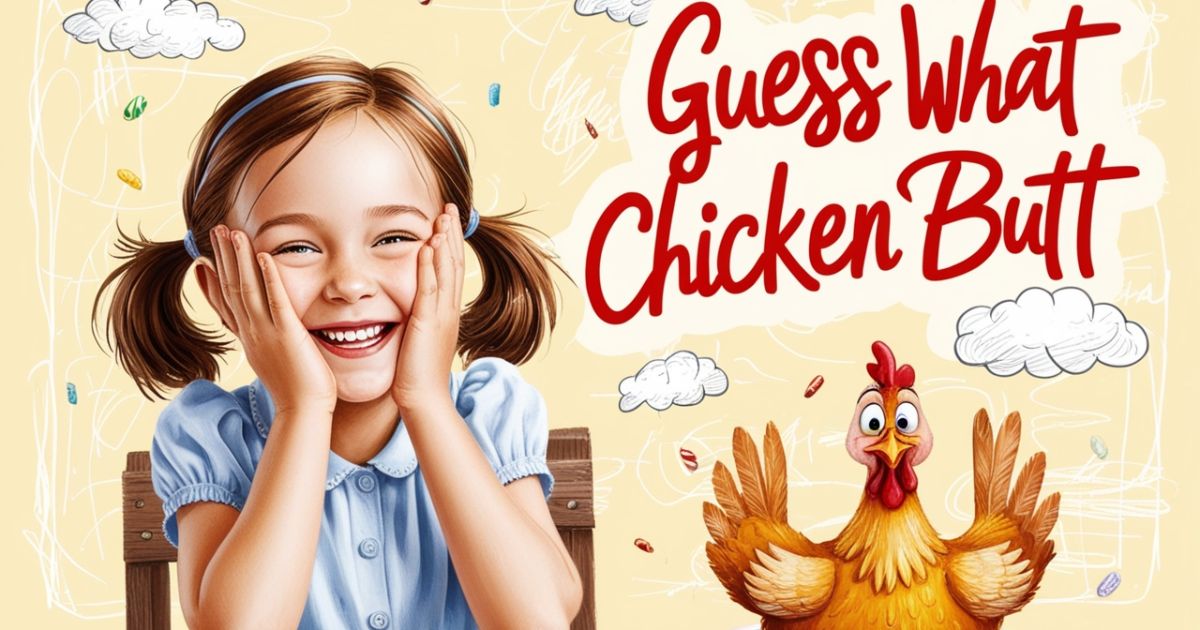Imagine this scenario: you are enjoying a peaceful moment at home when someone approaches you with obvious excitement and declares “guess what!” Instead of giving the expected response, you surprise them by saying “chicken butt.” The reaction might be laughter, surprise, or perhaps an exasperated eye roll, but you have successfully caught them completely off guard.
This peculiar exchange represents one of childhood’s most enduring verbal traditions. If you have never encountered “Guess What? Chicken Butt!” before, this comprehensive guide will provide you with everything you need to understand its meaning, historical background, and appropriate usage.
The Meaning of “Guess what Chicken Butt”
This expression functions as a two-part verbal exchange. The first person initiates with “guess what” and receives the unexpected response of “chicken butt” from their conversation partner.
The phrase serves no profound purpose beyond being a deliberate non sequitur designed to surprise and potentially amuse. Its primary function is entertainment rather than communication of meaningful information.
Sometimes individuals use this expression as a complete interaction. You might tell someone “guess what,” receive their curious “what?” response, and then deliver the punchline “chicken butt.”
This verbal play operates like a harmless practical joke, momentarily diverting someone’s attention without causing genuine offense or harm. The expression lacks deeper philosophical meaning and exists purely for comedic effect.
Children and playful adults represent the primary users of this phrase, with elementary school playgrounds and family homes serving as its most common venues. The concept of a chicken’s posterior holds particular appeal for individuals under ten years of age.
Alternatively, “Guess what, chicken butt” can function as a single statement, serving as both conversation starter and playful nickname. This usage allows for gentle teasing of siblings or friends without employing genuinely insulting language.
Examples of “Guess what Chicken Butt”
Child A: Hey! Guess what!
Child B: Chicken butt.
Child A: That’s not fair!
Student One: Hey, guess what!
Student Two: What?
Student One: Chicken butt.
Student Two: You got me again!
Brother: Guess what, chicken butt.
Sister: Stop calling me names.
Kid A: Guess what, chicken butt!
Kid B: You’re so annoying!
Other Ways to Say “Guess What Chicken Butt”
Several alternative expressions achieve similar effects depending on your intended usage. Some individuals substitute “Guess what” with “Snot,” though this variation appears more common in British contexts.
For those seeking to create harmless confusion, the sequence “guess what,” “what?” “nothing” produces comparable results.
When using the phrase as a single teasing statement, alternatives include “what’s up, chicken butt” (which creates a pleasing rhyme) or “guess what, silly goose,” though the latter lacks the original’s distinctive character.
When Not To Use The Phrase
This expression remains entirely colloquial and belongs exclusively in casual environments among friends and family members. While unlikely to result in termination or formal discipline, using it in professional settings may damage your reputation for maturity and professionalism.
Family gatherings typically provide safe contexts for this phrase, and children generally respond positively. However, many younger generations may be entirely unfamiliar with this traditional expression.
Workplace environments, formal presentations, and serious conversations represent inappropriate venues for this type of playful language.
Origins of “Guess What Chicken Butt”
The historical roots of this phrase extend surprisingly far back in time. Medieval butchers used large barrels, called “butts,” to store less desirable cuts of meat. The term “butt” originally described the container itself, derived from French linguistic influences.
Over time, the word “butt” shifted from referring to the barrel to describing its contents. These inferior meat portions became known as “butts,” and during periods of economic hardship, such cuts often represented the only protein many families could afford.
“Chicken Butt” therefore originally referenced these cheaper, less desirable portions of poultry rather than the anatomical posterior of the bird.
Cultural historians also suggest that the phrase gained popularity through the acclaimed opera “Porgy and Bess,” in which a character makes reference to chicken butts. The notion that such a childish expression might have emerged from high culture adds an amusing layer to its cultural significance.
This transformation from medieval commerce terminology to playground humor demonstrates the fascinating evolution of language through centuries of common usage.

Hello, I’m Daisy Sadie, a writer at Azaadpuns. I explore the dynamic world of puns and wordplay, delivering captivating linguistic twists that will make you laugh and groan. Join me on Azaadpuns.com for the latest in clever wordplay that makes language fun again.

